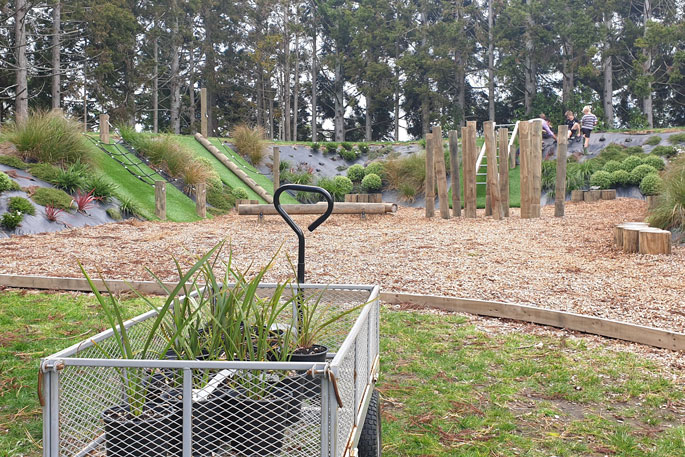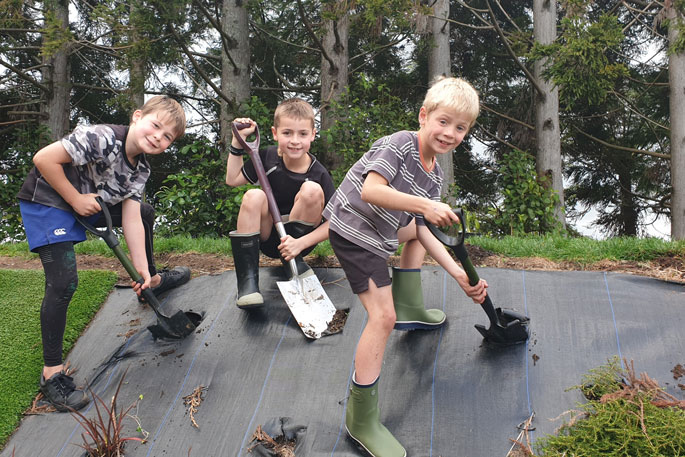It's been an exciting week for students at Pyes Pa School. A delivery of 27 plants has arrived as a reward for their recycling efforts – all part of the Paper4Trees programme they have been involved in since 2002.
Students Finn Paton, Tyler Carroll and Harry Davies are tasked with planting the small flax (harakeke) in their playground.
Full of energy and much enthusiasm, they put on their gumboots, grab their shovels and pull a small trolley filled with the plants over to their new home.
Pyes Pa School Principal Blake Carlin is teaching the boys the best technique to dig the soil and make sure the plants fit.
He says it's easy to get kids excited about recycling and looking after the environment when you give them responsibility.
'Students are responsible for the recycling and for the planting at the school. They love to have jobs within the school, and to know what they do is important and valued. This is a classic example here today – the boys are truly enjoying helping out and knowing they are contributing to the bigger picture.
'We try to link everything to our school values; Tu Teitei - stand tall, Mahitahi – collaboration, and Angitu - success for the future. That collaboration and success for the future is demonstrated through our involvement in the Paper4Trees programmes; we are striving for a sustainable future together.
'At just 7-years-old, these boys know the impact they are having. That student voice is the most powerful form of feedback.”
That statement is made clear when one of the boys, asked why recycling is important, keenly responds.
'You can save the world by not just dumping rubbish in the bin and leaving it on the ground as it can kill more animals and plants, and then we can't eat anything.”
Since 2007, Pyes Pa school has recycled 68.38 tonnes of paper and cardboard and received over 270 plants in return.
Environmental Education for Resource Sustainability Trust runs the Paper4Trees programme in 185 schools and preschools across the Western Bay of Plenty and Tauranga.
The programme is free to schools, with EERST providing the resources, equipment and support needed for schools to set up their own in-house paper and cardboard recycling systems.

The playground at Pyes Pa School where students have been planting.
Each school is provided recycling bins for every classroom and is asked to record their paper and cardboard recycling throughout the year.
EERST then rewards Paper4trees schools and preschools each year with native trees for their recycling efforts.
Schools are rewarded one native tree or plant per two cubic metres of paper and cardboard recycled.
The average order is 12-14 trees per school and 5-6 trees per preschool, however, larger schools can earn over 80 trees.
Last year, Western Bay and Tauranga schools diverted 545 tonnes of paper and cardboard from landfill, prevented 2,946 tonnes of carbon dioxide from being released into the air, and planted 2,103 native plants in their grounds and in the community.
Satsuki Takenouchi, Paper4Trees Programme Manager, says the programme provides both environmental and educational benefits.
'The effects of this waste minimisation, along with planting thousands of native trees each year, reduces methane being produced in landfills and the amount of carbon entering the atmosphere.
'There is also a behaviour change in students. EERST classroom recycling bins become a familiar resource, as students are introduced to them from a young age in preschool and continue to use the same system throughout their primary, intermediate and high school years.
'They grow up doing recycling and looking after the environment, so it becomes a natural thing for them to do. They don't need to think or make extra effort to do the recycling, as in their mind it is normal behaviour.
The programme also provides a positive and valuable learning experience for students.
'It's a chance for students to get out of the classroom and into their natural environment. Schools pick their own plants; some like to plant harakeke so they can make kete out of it, and some kindergartens like bee-attracting plants so they learn about the different species of bees.
'It's a valuable educational tool. It's also a lot of fun for students to plant the native trees they worked so hard to earn.”
With an estimated 2,200 native plants being awarded to schools across the region each year, EERST sought funding from TECT to support the costs.
In December, TECT approved funding of $36,000 over three years for the Paper4Trees programme.
Satsuki says it was a huge relief to receive the multi-year funding.
'To know we have that funding for the next three years is a huge relief for us. It has changed how we approach schools as usually when we are waiting for that yearly funding to be approved, it means we have a deadline we need to order plants by.
'Sometimes schools miss out as the organising teacher might have left, or there is a delay. When we get those late phone calls saying ‘we've missed the deadline can we still order trees', we no longer have to say ‘sorry you've missed it'. We can be more flexible.
'We don't receive any core funding from central government, and even with our funding from councils, nothing is guaranteed. So to get that three-year commitment from TECT means we can take a breath.”
TECT Trustee Mark Arundel says the Paper4trees programme tackles issues around waste management and the environment from multiple angles.
'The Paper4trees programme is a brilliant model that is working not only to shape positive behaviours in children around waste minimisation but also putting back into our community and environment with the planting of native trees.
'It's the kind of thing TECT whole-heartedly supports – a programme that is approaching a serious issue in our community from all angles while also ensuring there are no barriers to entry by making it free to participate. There are also great advantages of supporting this in schools and pre-schools, so awareness is being gained at an early age. We're delighted we could provide that three-year funding support.”



0 comments
Leave a Comment
You must be logged in to make a comment.